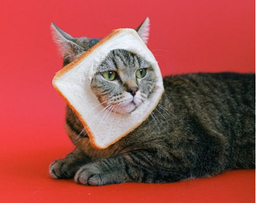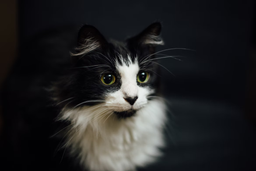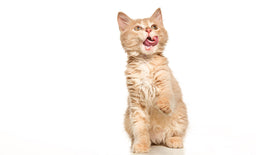Your cat's sleeping all day, not eating, and feeling drowsy? Tummy and dental troubles may be the cause
Cats tend not to show their feelings openly. As a cat parent, you need to have to notice the subtle signs your cat may give you that all is not well.
Cats are natural nappers, so lethargy may go unnoticed for some time—you may put it down to your cat sleeping slightly more than usual.
Changes to your feline’s eating habits are easier to spot, though. Whether your cat is a fan of wet, semi-moist, dry, or raw food, it should be relatively obvious when your furry companion stops eating the usual amount of food.
If cats are more lethargic than usual and off their food, you should look for a cause as quickly as possible before your feline experiences serious consequences.
While the vet should be your first port of call, some simple detective work can help make a quick diagnosis and address any issues before they become too serious.
Untamed is here to help you tailor-make a solution when your cat is sleeping all day and not eating—read on for the best tips and advice!

Cats spend long periods conserving energy for the hunt.
Source: Pixabay
What is a cat’s natural sleeping and eating behaviour?
A cat’s natural diet consists of:
- Mice or small rodents
- Birds
- Leftovers, scraps, and salvage from bins
In the wild, cats will typically hunt and eat up to twenty times a day and spend the rest of the time conserving energy by relaxing.
They may occasionally eat grass to give themselves a folic acid or fibre boost, but their nutrition is primarily animal protein and fat.
A cat eats to gain energy for:
- Hunting
- Reproduction
- Maintenance of organ function and muscle mass
While up to 70 per cent of a cat’s life may be spent snoozing, interspersed with short bursts of energy while on the hunt for food, this is not to be confused with lethargy and loss of appetite.
If your cat doesn’t react to normal stimuli, such as you walking into the room or putting food out, there may be something amiss. If their lethargy is accompanied by disinterest in food—particularly if your cat is older—you should start investigating whether your feline is suffering from some ailment.

“Yeah, I know you’re watching me. Stop it.”
Source: Pixabay
Is your cat not eating and sleeping a lot? Common causes explained
If your cat is lethargic and not interested in food, there may be a simple explanation.
Loss of appetite and lethargy often go hand in hand, and the most common causes are:
- Stomach upsets
- Dental problems
- Hairballs due to excessive shedding or grooming
- A recent change in diet
- Eating something toxic
Stomach upsets
Cats’ digestive systems are highly sensitive, and the slightest upset can cause diarrhoea, vomiting, or both.
If your cat has eaten something potentially dangerous, their first instinct will be to avoid food until nausea or discomfort has worked its way through the system.
The lethargy you notice may be part of your cat’s recovery process but may also be due to felines’ hardwired self-preservation instinct.
As well as being avid hunters, wild cats can also be prey for larger predators. As larger carnivores often target weak or unwell-looking animals, your cat’s instinct is to hide any sign of weakness and avoid being identified as potential prey.
Sleeping in a hideaway is an excellent way to keep out of danger.
Dental problems
If your cat has cracked or lost a tooth or suffers from gum disease, eating can be painful.
Even something as trivial as a small laceration in the mouth can cause pain, particularly if your feline typically eats dry kibbles.
If your cat is not eating and seems abnormally quiet, you can try to check for any obvious signs of oral problems.
In case you spot something, you may be able to ease your feline’s suffering and restore appetite by mixing dry food with warm water, a broth, or soup, or switching to wet food.
Hairballs due to excessive shedding or grooming
Cats are fastidious and will occasionally collect enough hair in their stomach to form a hairball.
The process is entirely natural and does not cause most cats any anguish, but it may result in them feeling slightly queasy until the hairball is regurgitated.
You can help the hair pass through your cat’s system with high-quality nutrition, but cleaning up the occasional ball of fur and mucus is a fact of life for cat parents.
A recent change in diet
One of the most common causes of nausea and fussiness in cats is a change in diet. The most common nutritional changes causing stomach upsets are switching from:
- Dry to wet food
- Low to high-quality nutrition
- Low to high-protein food
- Diet food to high-calorie products
Even something as simple as changing flavours can cause a cat to feel mildly uncomfortable and experience short-term diarrhoea. Changes in the type of food or feeding pattern particularly affect:
- Kittens—After weaning onto kitten food, a kitten’s digestive system needs time to get used to the new diet. You should keep a close eye on weight gain and adjust feeding amounts accordingly
- Senior cats—Older cats’ digestive systems lose efficiency over time, so you may see more frequent tummy upsets. As long as you monitor your cat’s weight and make sure anorexia doesn’t last more than 24 hours, there is no cause for alarm
You can help manage any change in diet by mixing the new food with the old over a week.
Eating something toxic
Cats lack the enzymes to metabolise many human food products. Given how curious they are, cats are prone to trying any food left lying around, which can lead to them nibbling something harmful.
The most common products toxic for cats are:
- Chocolate
- Fruits, such as grapes or citrus
- Coconuts
- Milk or cheese (special cat milk or yoghurt are less dangerous)
- Coffee or alcohol
- Onions, garlic, or chives
- Dough and products with raw yeast
- Raw chicken and eggs, which are not toxic but can contain harmful bacteria
Many household plants can also cause a stomach upset in a cat, so you should develop a routine of making sure any potential dangers are kept well out of your feline’s reach.
Most conditions are trivial and should sort themselves out within a day. If your cat remains lethargic and unwilling to eat longer than that, you should investigate whether something more serious is afoot.

“Leave me alone! I’m sick!”
Source: Pixabay
Cat not eating much and sleeping a lot—more serious reasons
Longer-term lethargy and anorexia can be a sign of more worrying conditions, the most common of which are:
- Bacterial infections, viruses, or food allergies
- Diabetes and pancreatitis
- Kidney failure
- Liver insufficiency
- Cancer
Bacterial infections, viruses, or food allergies
Any infection is likely to cause your cat to shy away from food, and sleeping more than usual could be your feline’s way of fighting the disease.
Most bacterial or viral diseases can be treated by your vet but will have serious consequences if left undiagnosed.
Food allergies are a different matter. They occur when your cat’s body mistakes proteins in food for harmful invaders and mounts an immune response.
The most common food allergy symptoms are red pustules on the skin, but your cat may also be sleepy and uninterested in food.
Once localised, you need to eliminate the cause of the allergy from your feline’s diet.
Diabetes and pancreatitis
Diabetes and pancreatitis are common ailments in cats that have expanded a bit too far sideways.
The conditions are particularly prevalent in indoor and neutered male cats and often result in lethargy and disinterest in eating.
While you may be able to manage diabetes and pancreatitis with a carefully-controlled diet, your vet may prescribe regular insulin injections to help your feline control blood sugar levels.
Kidney failure
Kidney failure in cats is hard to spot as symptoms only become noticeable when around 75 per cent of renal function has been lost.
Lethargy and loss of appetite are key symptoms of kidney failure, but you need to visit the vet to have various tests carried out to be sure.
While kidney damage cannot be reversed, you can help your cat maintain quality of life with proper nutrition.
Liver insufficiency
Cats with compromised liver function will often feel nauseous and lacking in energy.
If your vet diagnoses a liver problem, the prescribed treatment can last up to eight weeks and involve extensive medication and careful dietary control.
Cancer
Cats are susceptible to the same forms of cancer as humans, and an early diagnosis is crucial to ensure the best chances of survival.
The most crucial factor in all these conditions is spotting the symptoms and acting as quickly as possible.
If your cat doesn’t eat for more than 24 hours, there is a danger that they will start to mobilise fat reserves to get energy, resulting in rapid weight loss.
The result can also be hepatic lipidosis, in which the liver can’t cope with the flood of fat cells and deposits them around its surface area, hindering liver function.
As soon as you notice that your cat has been lacking in energy and not eating for more than a day, you should go to the vet for a check-up.
What can you do when a cat is very lethargic and not eating?
If you are worried about your cat’s lethargy and lack of appetite, you should arrange a vet appointment as soon as possible.
If the symptoms are mild and your cat is only slightly less energetic than usual, you should:
- Check for any causes of stress
- Make their meals more enticing
Checking for any causes of stress
Cats are creatures of habit and can quickly become stressed by changes to their routine.
Typical stress-inducing factors include:
- Different feeding or resting times
- Too many new visitors to the house
- The arrival of a new pet, either at home or in the neighbourhood
- A change in food
- The food bowl being moved to a new location
While this may sound like your cat runs your household, long-term stress can have serious consequences for your feline.
You should try to eliminate the potential stress factors as quickly as possible.
Making the food you offer more enticing
Your cat’s sense of smell is as important as taste when it comes to food. If you are feeding a bland diet, and your cat has the sniffles, you can make it enticing by warming it to release a stronger smell.
If your senior cat’s eyesight has deteriorated, they may struggle to find their food bowl if you’ve moved it. You must also make the feeding area accessible for a cat suffering from arthritis or joint pain.
The best thing you can do to help your cat regain an appetite is to offer the best nutrition you can find.
The highest quality nutrition can help with energy and appetite
Adequate food will help your cat avoid illnesses, keep their energy levels healthily high, and get them excited over the next meal.
As obligate carnivores, the best food for your cat contains the ideal ratio of:
- Animal protein
- Animal fat
Animal protein
Meat and fish provide all the amino acids needed to:
- Build muscle
- Keep the skin and coat in good condition
- Maintain organ health
The quality of a protein source for cats is measured by its biological value (BV), and the best proteins are:
|
Protein source |
Biological value |
|
98% |
|
|
94% |
|
92% |
|
87% |
|
|
68% |
|
Below 65% |
Your cat’s diet should contain a high percentage of protein with a BV of over 90 per cent.
Animal fat
Animal fat delivers essential fatty acids and makes any meal taste delicious.
If your cat food is enriched with animal-based jelly or gravy, your feline should go wild about the taste.

The best you can do for a sick cat.
Image (c) Untamed
Untamed can get your feline’s playfulness back
Getting Untamed cat food is the best way to give cats their energy back and keep them healthy and happy.
The critical factors in rousing your kitty from lethargy and making sure food is wolfed down are:
- High levels of animal protein
- Vet-formulated recipes
- The highest-quality ingredients
High levels of animal protein
Untamed recipes contain twice as much animal protein as most commercial cat foods, and our meals are entirely grain-free.
With such high-quality ingredients, your cat will need less food to stay full of energy and will be able to digest each meal easily—irritable bowel syndrome, constipation, and other digestive problems should become a thing of the past.
High levels of animal protein are also crucial in managing urinary tract infections, such as cystitis or bladder stones.
Vet-formulated recipes
Every Untamed formula started as a homemade recipe and has been fine-tuned according to the advice of vet nutritionists.
All our products are free from known allergens and contain all the nutrients your cat needs—in a mouth-watering form.
The highest-quality ingredients
Our ingredients are fit for human consumption, and we make sure that you won’t be feeding any artificial:
- Flavour enhancers
- Colourants
- Supplements with unintelligible scientific names
Untamed products are also good for the planet. Our production processes are ethically sound, with our meat and fish being sourced cruelty-free and from sustainable suppliers.
All our packaging is one hundred per cent recyclable.
Untamed is the best thing you can do for your lethargic and sick cat—try us out to check out the benefits!
How can you try Untamed?
Getting your cat’s paws on Untamed is easy—go to our online cat food store, and your first tins will be on their way to your door in a few clicks.
Here’s how to get your Untamed journey underway:
- Answer some quick questions about your feline
- Select the best meal plan for your kitty
- Order your trial pack
Once your trial pack arrives, you can check which flavours get the biggest thumbs-up. We will make sure you never run out of your cat’s favourite dishes with regular monthly meal packs to your door.
The effect of Untamed’s quality should be quick:
|
Timeline |
The Untamed effect |
|
Within a week |
You should see:
|
|
In two months |
Your kitty should be:
|
|
After four months |
You should notice:
|
|
For life |
Untamed’s great nutrition should:
|

That’s more like it!
Image (c) Untamed
Untamed is your best route to rousing your cat from short-term lethargy.
The closer you monitor your kitty, the more likely you will be able to spot any issues and react quickly.
Your cat’s nutrition and health are in your hands, and Untamed is here to help!

![Best food for Ragdoll cats in the UK [Broken Down]](http://untamed.com/cdn/shop/articles/featured_best_food_for_ragdoll_cats_uk.jpg?v=1646818249&width=256)

